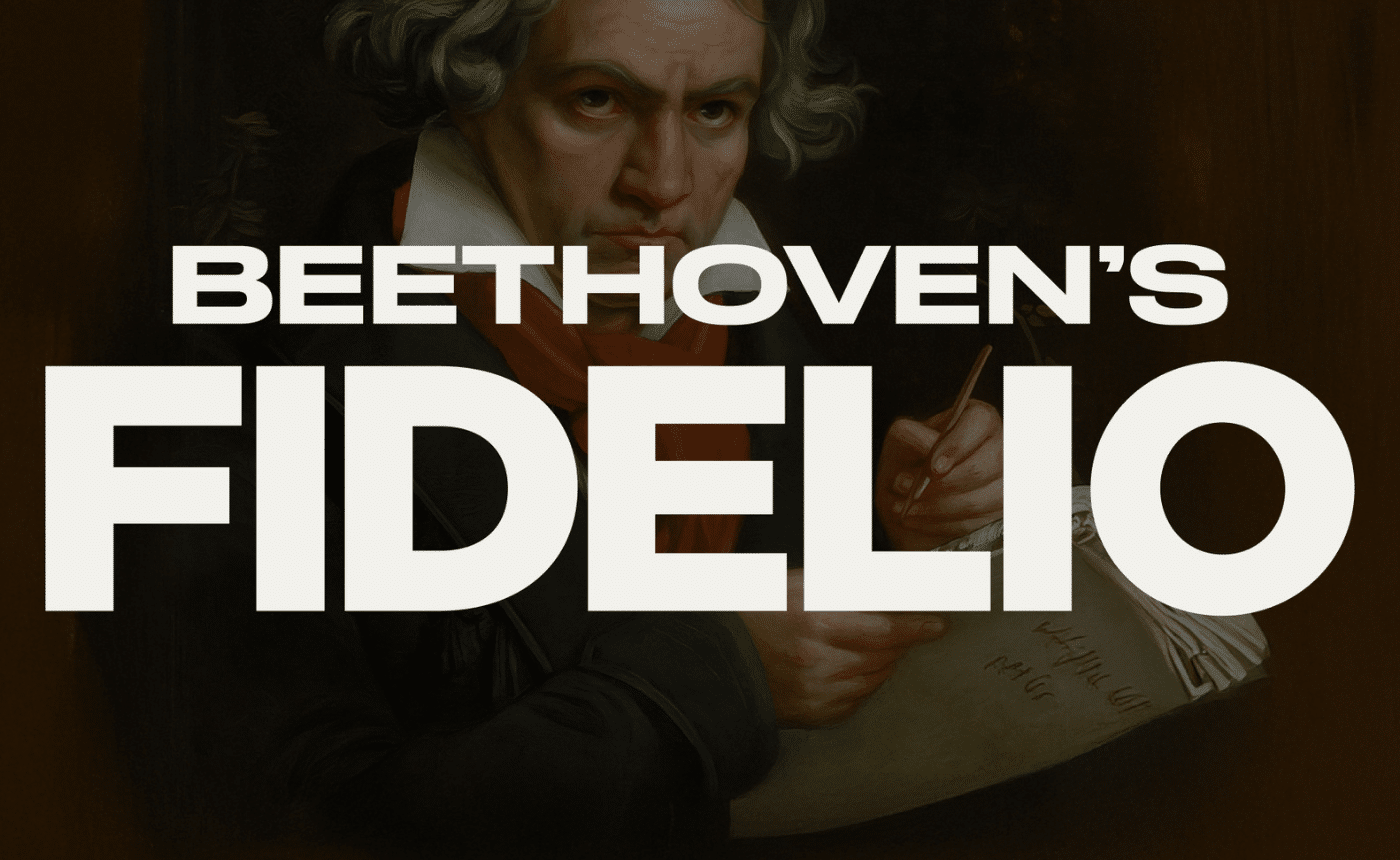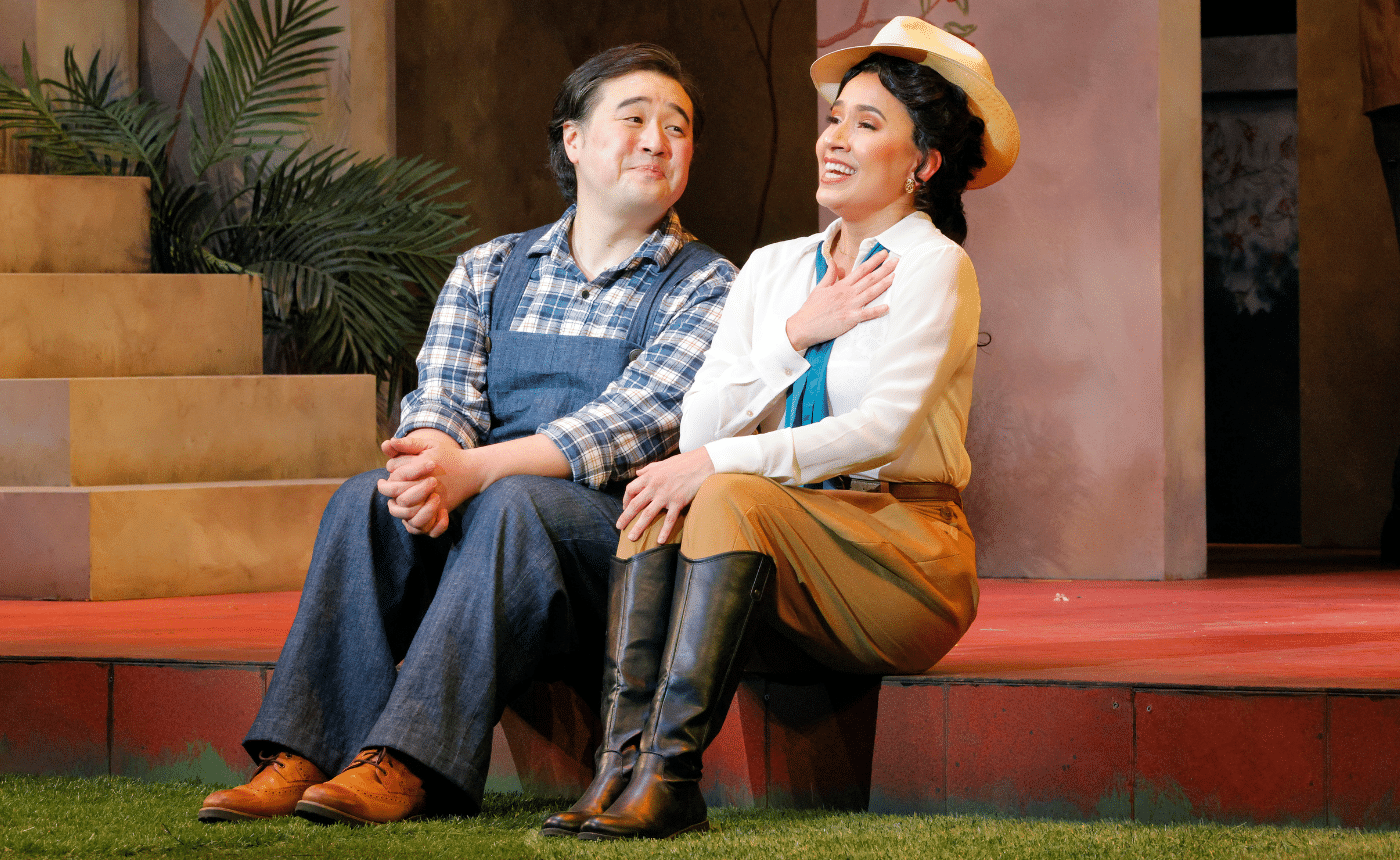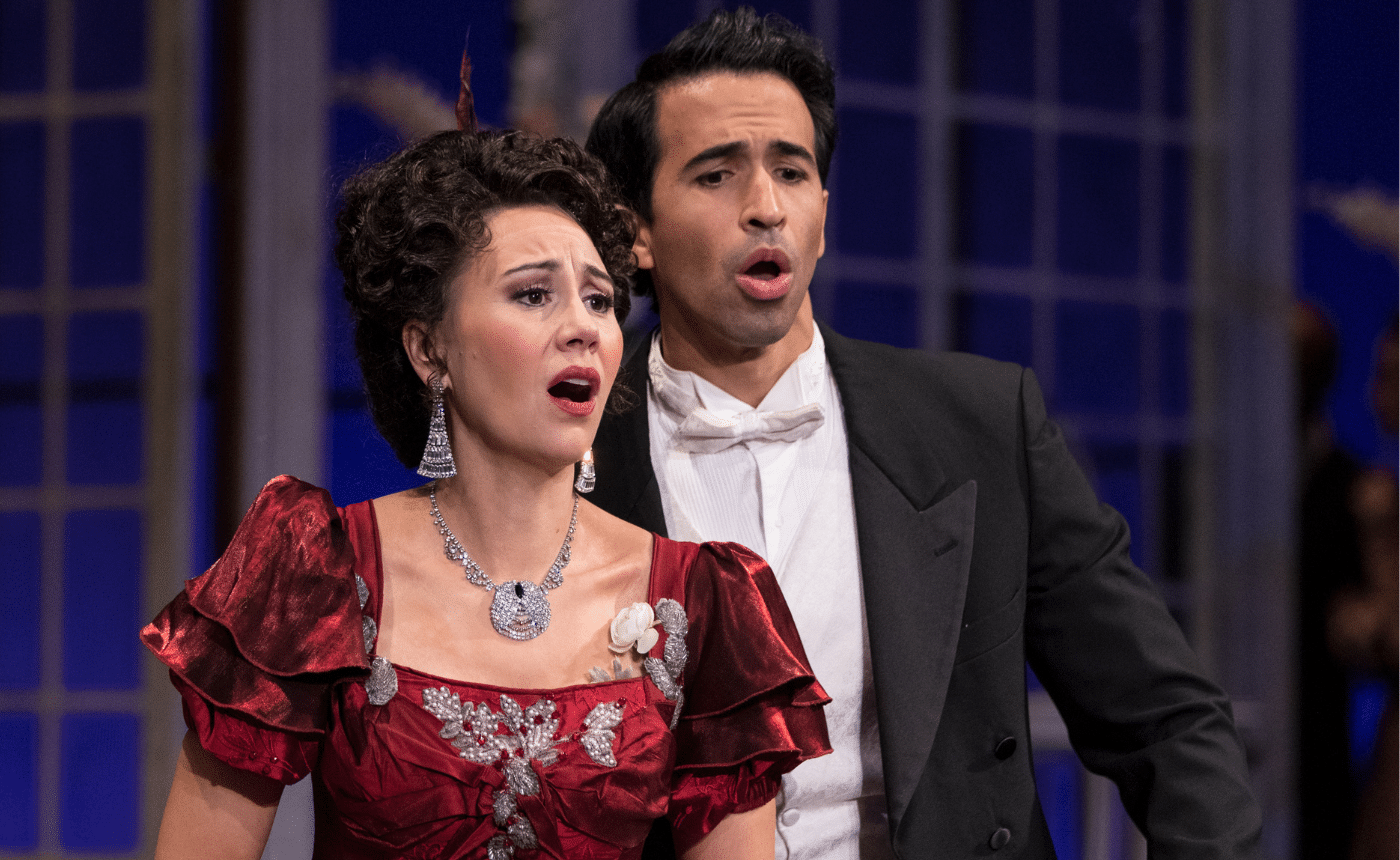The Barber of Seville Online Course by Dr. Paul DorganPart 3: The Musical Story of Act 2
With the libretto asking for a piano on-stage, we must be in the Music Room of Bartolo’s house. B. has been trying to identify the soldier from the previous scene, but even the regiment doesn’t know him; he’s sure Almaviva sent whoever it was, in an attempt to ascertain Rosina’s inclinations. Knocking interrupts his train of thought and he orders the servants to admit whomever it is.
1st violins play an idea which is as obsequious as it is mocking, answered by sniggering clarinets. The visitor wishes eternal joy and peace on the household. Bartolo thanks him: the face seems familiar, but he can’t remember where he might have seen it; Almaviva – for it is he – reckons his new disguise will work better in his attempt to speak with Rosina, and returns to his smarmy greeting. As B. becomes more frustrated with this repetitive greeting, A. rejoices that he will soon see and talk with Rosina: perfectly expressed by the tenor’s passionate vocal line over the bass’s patter. Who are you? Don Alonso, music teacher and student of Don Basilio, who is ill. Bartolo immediately wants to visit him, but is told it’s not a serious illness. What Alonso says next rivets Bartolo’s attention. He and Almaviva are staying at the same inn and, by chance, a letter from Rosina to Almaviva, fell into his hands. Alonso suggests that, during a voice-lesson with Rosina, he might convince her that he was given the letter by another of the Count’s lovers. Bartolo immediately recalls Basilio’s Act 1 “slander” plan and is delighted; he leaves to fetch Rosina for her lesson. Almaviva hopes he’ll be able to explain his plan; if she agrees to it, he’ll be the happiest man on earth.
Bartolo introduces Rosina to Don Alonso who will give her a voice lesson; she excuses her cry of recognition as a “foot cramp”! Sit beside me while I teach you; what will you sing? An aria from “The Useless Precaution”. (Remember that Beaumarchais’s subtitle for his play was used at that opening night at the Argentina!) Rosina gets her music, Alonso goes to the piano, ready to accompany her, and Bartolo sits nearby. Of course the aria is fully orchestrated, but a few bars for the piano is notated in the full score. The orchestral introduction is marked “Majestically,” and so it begins; but the 1st violins and solo flute are soon giggling their way up and down an octave – they get it together for the majestic final chords of the prelude. Rosina sings that a true lover cannot be defeated by a tyrant, for love will always prevail. The brilliant vocal writing is lost on Bartolo, who falls asleep. The tempo changes to Vivace. She tells Alonso/Lindoro what a brute her guardian is and begs him to save her. Don’t worry, he reassures her, trust me. Bartolo starts to wake up and the aria is resumed; the text tells of Rosina’s delight in A/L’s words, and the vocal embellishments reinforce her emotions.
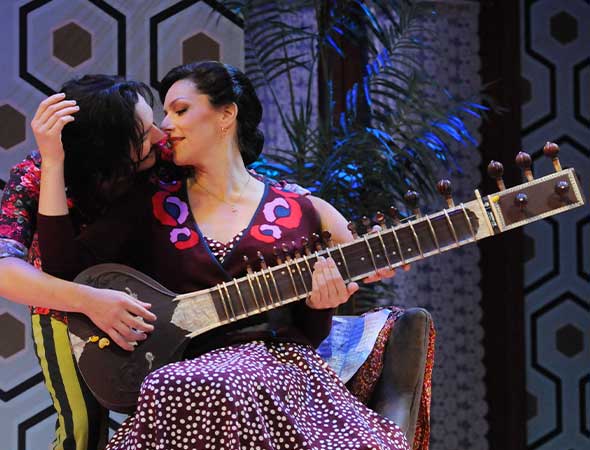
Opera Philadelphia’s production of The Barber of Seville. Almaviva (Taylor Stayton) woos Rosina (Jennifer Holloway) disguised as the poor Lindoro. Photos by Kelly & Massa.
What a beautiful voice, comments Alonso; Bartolo agrees, but adds that the aria was very boring and not at all like the music of his youth. He tries to recall an aria sung by the singer Caffariello; maybe he’s misremembered the name, for there was a very famous castrato, Caffarelli (1710-1783). The song comes back to him and he sings it, admitting that he changed the name from Giannina to Rosina. Figaro enters with a basin: he has come to shave the Doctor, who tells him he’ll have to come back tomorrow. Impossible, says Figaro; lists his many appointments for the day; acts insulted and makes ready to leave. Reluctantly, Bartolo agrees to be shaved and tells Figaro to go bring the towels from another room, and is about to give him a bunch of keys, but changes his mind and goes himself. F. wishes he had been given the keys and asks Rosina if the key to the shutters is on the key-chain? It’s the newest one, she tells him. B. returns muttering to himself that he should never have left Figaro; giving the keys to F. he tells him where everything is to be found and warns him not to touch anything else. Bartolo tells Alonso that F. brought Rosina’s letter to him. An almighty noise of smashing crockery is heard and B. rushes out to see what has happened. Alone together Alonso/Lindoro proposes to Rosina, who accepts. The men return with B. cataloging what has been broken; F. shows the Count the key to the shutters which he has stolen from the bunch. Bartolo sits and tells Figaro to begin the shaving.
Even the orchestra is surprised by the arrival of Don Basilio, for all the players unite in a huge full-orchestral ta-DUM in Eb – itself a surprise, since the previous recitative ended in C major. Rossini’s ensembles are often held together by a recurring idea in the orchestra, and we heard this in the first section of the Act I finale. Here it’s a three-note descending figure outlining the chord of the harmony, initially played by 1st violins and bassoon. Are the clarinets commenting on the fun of the situation? The plotting trio is concerned; Bartolo asks how Basilio is, but Figaro interrupts his answer, wondering if the shave will actually take place. And your assistant, asks Bartolo? The Count quickly assures both of them that everything (whatever that might mean!) is under control, and begs Bartolo to get rid of Basilio.
Why, Alonso asks Basilio, are you out in public with a fever? You are as yellow as a corpse! Figaro, the medical practitioner here, diagnoses scarlet fever and encourages him to go home to bed; the Count quietly gives him money to buy medicine. Everyone encourages him to go to bed; eventually he agrees. In a wonderful conclusion to this Quintet they bid “Buona sera” to Basilio, while he tells them he’ll see them again tomorrow.
The shaving resumes. 1st violins are very busy, introducing another of those recurring ideas, this one directed to be played al ponticello, a sound we heard in Bartolo’s first act aria. Figaro makes sure that Bartolo will not be able to see the lovers who sit together, pretending to study Rosina’s music. The busy-ness stops and the strings outline the notes of the chords as Alonso/Lindoro quietly tells Rosina that at midnight he and Figaro will come to take her away. Thinking B. might have overheard this, F. cries out, the al ponticello theme returns and F. explains there’s something in his eye, but don’t touch it – just blow on it! The chordal outlining from the strings returns as Rosina promises to be ready when they come. Alonso starts to explain about the letter and his disguise, but Bartolo has become suspicious, interrupts his shaving, and overhears “disguise.” He curses them all, while the plotting trio try to calm him down. What they sing is not very interesting – mostly repeated notes – but listen first to the off-beat melody from the clarinets; it drops out after a while, but then 2 piccolos and the 1st violins play a new melody with the singers; finally the entire orchestra, including the sistra. Dramatically this is a wonderfully comic scene, but that’s thanks to the original Beaumarchais play. Music, even when attached to words, is never going to evoke the guffaw that, say, slapstick comedy does; but some composers in some of their works make us smile, and maybe even giggle a bit. Verdi’s Falstaff is a smile from that first fat chord to the last, and we can giggle at the notion of an Italian ending an opera with that most rigidly-Germanic form of a “fugue”, as does Verdi’s last opera. If we know about the character who inspired Richard Strauss’s tone poem Til Eulenspiegel (and we can learn more about him from the just-published “Tyll” by Daniel Kehlmann!) then his orchestral pictures will make us smile. Rossini, more often in his ensembles than in his arias, makes us smile, and if you aren’t smiling at the end of this Quintet, you must be a very dour person indeed!
The stage direction says that everyone, except Bartolo, leaves: does he chase them out of the room? Bartolo curses himself for not noticing anything till now. Basilio must know something. He summons his two servants and tells Ambrogio to fetch the music teacher immediately; Berta is to guard the front door, but then decides to do it himself. Alone, Berta complains about the noise in the house: quarrels; tears; threats – there’s not a moment of peace with this old grumbling miser.
After two bars of string vamps flute, clarinet and 1st violins begin a perky tune which turns out to be the melody for Berta’s first verse: The old man wants a wife; the young girl wants a husband; they rage and rant; both mad! A new idea is given us by the 1st violins which becomes the principal melodic interest in this section, as Berta wonders what is this thing called love. It’s a universal madness; in a recitative-like passage she enumerates the symptoms: a craze; a pinch; a tickle; a torment. Silence. Then she confesses, vocally sobbing, that she feels that same love, but doesn’t know how it might end. Cursing old age, she leaves, admitting that she’ll probably die an old maid.
We now return to the room which was the setting for the second scene of Act 1. The usually lethargic Ambrogio must have been roused to speed, for there is Don Basilio denying any knowledge of Don Alonso and suggests Alonso and the Count are the same person – after all, he has the purse to prove it! Bartolo tells him to bring the notary here quickly, so his marriage to Rosina can be signed and sealed. It’s pouring rain, objects Basilio and, besides, the notary has an appointment with Figaro to go over the details of his niece’s marriage. He doesn’t have a niece says Bartolo: some plot is afoot – hurry and get the notary! Basilio leaves. Rosina is summoned; is told that her Lindoro has another girl-friend; and is given the letter “Alonso” gave to Bartolo. Rosina recognizes her writing. Remember the letter from Rosina to Lindoro which “Alonso” gave to Bartolo? I know, it’s complicated, but I’ll try to untangle the matter. In the second scene of Act 1 Figaro insists Rosina write a letter to her serenader who had told her he is Lindoro; and she believed the drunken soldier and “Alonso” to be Lindoro in disguise. In the second act “Alonso” gave that letter to Bartolo telling him it was addressed to the Count by a different lover. To Bartolo’s thinking, Rosina’s letter to Lindoro was passed on to the Count; meanwhile Alonso and Figaro, hired by Almaviva, are planning to abduct you and give you to the Count. In despair at Lindoro’s apparent betrayal Rosina agrees to marry her guardian, and tells him of their original plan for the lovers to elope by means of the window, since they have the key to the shutters. Lock yourself in your room, my child, while I go to fetch the police: he goes. What a wretched fate laments Rosina as she leaves.
Basilio’s weather forecast proves accurate as a distant roll of thunder is heard from violas and cellos. Flute gives us a flash of lightning. More thunder and lightning. Then raindrops from the strings; flute and clarinet add more rain while the cellos rumble more thunder. A loud swirling string figure indicates that Basilio’s worst nightmare has arrived: a huge storm! The string gales of wind are answered by the pelting rain of the winds; the stage direction requires that “frequent flashes of lightning” should be seen through the shutters, and that thunder should be heard. Eventually the storm dies down – the winds tell us that, though the strings suggest a few rain-drops are still around! Rossini’s storm is certainly tame when compared with, for example, the 4th movement of Beethoven’s “Pastoral” Symphony, which was first heard in Vienna eight years earlier; though it’s doubtful Rossini would have heard a performance, or seen the score. And it becomes a light shower when compared with the storms conjured up by Wagner in his 1843 Flying Dutchman (check that out in next season’s schedule!); with Berlioz in Les Troyens (1863); and with Richard Strauss’s Eine Alpensinfonie (1915). Mentioning Strauss, you could easily think of Rossini’s storm as a very early example of what became one of that later composer’s masterly composition groups: the “Tone Poem”, where the orchestra tells us a story: think of his Don Juan; his Till Eulenspiegel; Don Quixote; Ein Heldenleben. What strikes me about Rossini’s storm is the absence of the most obvious “thundery” instrument: the timpani! How can it be possible to conjure an orchestral storm without a single thump from the percussion section? Rossini manages it very successfully!
The storm subsiding, the shutters are opened from the outside and the rain-soaked Figaro and Almaviva come in having climbed a ladder to the window. Rosina enters, but repulses Alonso’s advances, to the amazement of the guys. She accuses Lindoro/Alonso of being a go-between for the Count who wants to seduce her. Do you love Lindoro? So much! He kneels and confesses that he is not Lindoro, but Almaviva. The orchestra is amazed into F major! 2nd violins and violas begin a sighing/suppressed-excitement figure. What a surprise, she sings, and the 1st violins echo her vocal twiddle; as she recovers her composure her vocal line becomes more elaborate. Figaro is delighted at the success of his plotting. Almaviva repeats Rosina’s melody, now in C major; his vocal line illustrates the “delirium” he feels: it’s more ornamented. Figaro repeats his delight and then takes over the melody of the lovers, adding a vocal flourish to its end.
Another new idea from the 1st violins as Almaviva offers Rosina his name: essentially proposing marriage; of course, Rosina accepts, and, to a plucked-string accompaniment, sings of the joy of marriage, to which Almaviva responds in kind. Figaro, though, is impatient: mockingly echoing bits of their vocal lines, he tells them it’s time to leave. One scholar noted that Figaro’s echoes were “first worked out…in the innocuous context of the cantata Egle ed Irene…“ which dates from 1814. I’ve looked at the score of the cantata and, other than the second voice entering with the same melody a few bars after the first voice, (which we’ve heard many times in this opera) I can find none of those said echoes ! The lovers are oblivious to his urgings and, with increasingly elaborate singing, they praise Love for finally taking pity on their sufferings. Finally they pay attention when Figaro looks out the window and sees a lantern and two people. What to do? The Count suggests leaving quietly by the ladder which they used to enter the room; the others agree: that “canon” thing again. The last page always brings a big smile to my face, for its bouncy rhythm seems to look forward to Broadway in the 1920s!
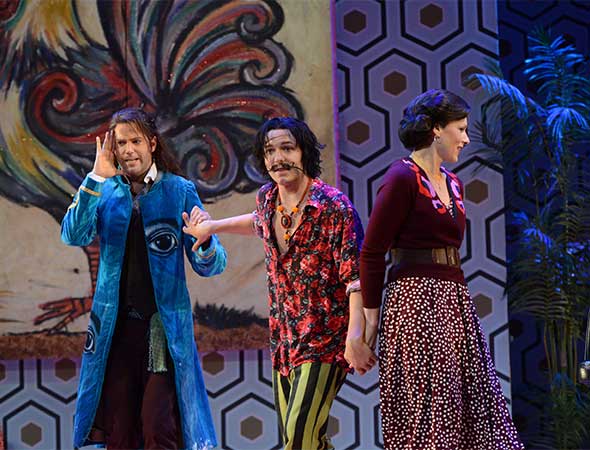
Opera Philadelphia’s production of The Barber of Seville.Figaro (Jonathan Beyer) tries to help Almaviva (Taylor Stayton) and Rosina (Jennifer Holloway) escape Bartolo’s house. Photos by Kelly & Massa.
Their joy quickly turns to fear when Figaro realizes the ladder is no longer there. They hear voices and hide. Basilio, with a lantern, is here with the Notary who has a document in his hand, calling for Bartolo. Figaro tells Almaviva who these people are and then greets the Notary. You should have been at my house to draw up a marriage-contract between my niece and Count Almaviva; they are both here; do you have the document? He does. Basilio’s objections are interrupted by Almaviva who offers him the choice between a valuable ring or two bullets in his brain. I offer no prize to those of you who correctly guess Basilio’s choice. The document is signed: the Count and Rosina are now man and wife.
Enter Bartolo with an officer and soldiers and demands that they arrest Figaro and the Count. The officer asks his name; the Count replies it is an honorable one, and that this lady is his wife. Objection from Bartolo; over-ruled by Rosina! Enraged, Bartolo insists on Alonso’s arrest who angrily objects. To the officer’s request to identify himself he says he’s Count Almaviva. Which provokes an outburst from the strings, expressing Bartolo’s outrage. The Count tells him to calm down and that his days of tyranny over Rosina are ended. She is my wife. Turning to Rosina, he vows they will be united till death: come to the arms of your faithful husband. (But see below!)
In an aria which is usually omitted, the Count develops the words of his recitative. To Bartolo he says no longer will you have any control over this innocent girl, and turning to Rosina he begs her to rejoice in her new-found husband. Reasons why it’s cut from Barbiere? Dramatically it’s redundant, and vocally it’s incredibly difficult. It seems Rossini didn’t have much faith in it in because the following year its final section became a more simplified final section for Angelina’s final aria in La Cenerentola.
Finally Bartolo recognizes his mistake in wooing Rosina; though he turns on Basilio as an accomplice, who tells us that he couldn’t resist the Count’s financial “arguments”! Bartolo’s other mistake was, he admits, to remove the ladder, which allows Figaro to suggest that it was a “Useless Precaution” – the subtitle of the original Beaumarchais play. Rosina looks forward to happiness with Count who rejoices in Rosina’s love for him. And all ends happily.
Or does it?
We can hope that Almaviva and Rosina were, initially, happy together, but check in with them, some three years later, in Mozart’s Le nozze di Figaro; I think we’d all agree their marriage has run into problems. And then read Beaumarchais’s final play of the trilogy: La mère coupable. Which Darius Milhaud (1892 – 1974) turned into an opera which premiered in Geneva in 1966. By the way, its Opus Number is 412!
Let’s leave the Almavivas as Rossini left them – filled with the ecstatic joy of young love!



